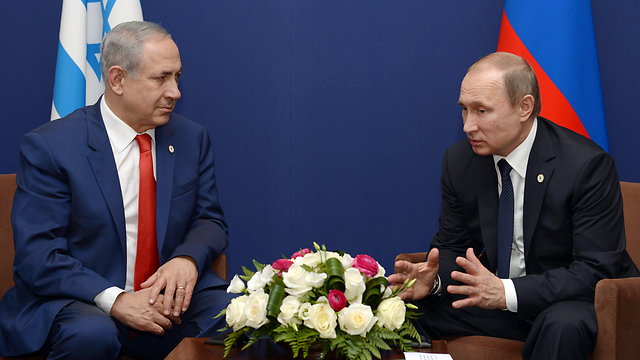
Putin and Netanyahu meet in Moscow
צילום: AP
Don't mess with Putin
Op-ed: If there's reason to believe Israel will pay a price as part of an agreement between the world powers on Syria, we should raise these concerns in Washington and Moscow. But public, provocative declarations about the Golan Heights are counterproductive.
It's hard not to see a connection between two events taking place this week, in both of which Prime Minister Benjamin Netanyahu plays a central role. The first is the exhibitionist government meeting in the Golan Heights, and the other is Netanyahu's scheduled meeting with Russian President Vladimir Putin on Thursday.

Netanyahu's declaration that the Golan Heights must remain part of the State of Israel and must not be returned to Assad under any agreement about Syria - is the right one. Israel cannot concede the Golan, primarily because it would be impossible for it to defend itself without it. That point is easy to prove in professional dialogue, and I haven't encountered anyone who could prove otherwise.
There were quite a few Israeli officials in the past, including prime ministers, who thought Israel should promote a peace agreement with Syria, and give up the Golan as part of this agreement, especially when negotiations with the Palestinians were stuck.

Netanyahu and Putin in their last meeting in Paris (Photo: Amos Ben Gershom, GPO) (צילום: עמוס בן גרשום לע"מ)
This attitude represents a complete lack of understanding regarding the difference between the Palestinian issue and the Syrian one. The world demands that we reach an agreement with the Palestinians not because of a territory dispute, but because we're living in a reality in which one people occupies another. This is an unacceptable phenomenon in the 21st century.
In the Golan Heights, however, there is a territorial dispute between two states, the likes of which exist in dozens of other places in the world, and most of these disputes are unsolvable.
The problem, therefore, is not in Israel's position on the future of the Golan, but in the tactic that was chosen: To put the issue on the agenda in a public and provocative manner. Who needs that?
If there is good reason to believe that Israel might pay a price as part of an agreement between world powers about Syria, then we should definitely discuss this in Washington and Moscow.
About two years ago, we saw that when these two nations reach an agreement, like in the case of destroying Syrian's chemical arsenal, there is nothing that could stop it. Meetings in Moscow and Washington are vital, but why make declarations in advance?
In 2004, after Israel and the US agreed on the Gaza disengagement plan and it became public, I was sent as the head of the National Security Council by then-prime minister Ariel Sharon to present the plan to the Russians. I met, among others, with Russian Foreign Minister Sergey Lavrov, who admonished me: "Why are you coming to tell me about something that has already been declared and made public? I can read about it in the paper. Why didn't you think to consult with us before making the decision?"
Lavrov remains the same, as does Putin. If there is one thing they hate is not having a say in the matter. In Israel, many confuse diplomatic relations with diplomatic moves. In reality, these are two opposite things. Diplomatic relations are about loudly telling the world how good we are and how evil our enemies are. Good diplomatic relations carry some weight, but it's negligible. A diplomatic move, however, is done behind the scenes and its purpose is to convince international players that they should, for the sake of their own interests, to choose a position that would also serve our interests.
The more this move is kept under wraps, the easier it is for the other side to make the desirable move (and easier to us as well), while presenting it as their decision and not the result of pressure or influence. If such a covert move had already been made with the Russian, then why anger them with a public declaration made from the Golan Heights? And if such a move is still in the works, there's nothing worse than not letting them have their say.










